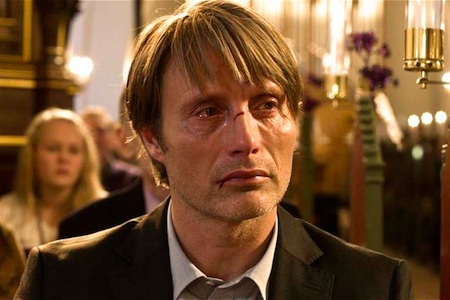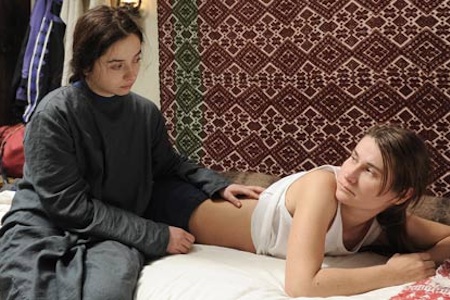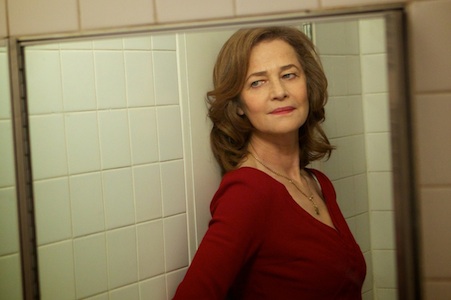Vancouver isn’t the critical/awards bellwether that Toronto or Venice or New York or even Telluride can claim to be, but this year its international line-up offers an interesting contrast in temperaments.
On the one hand, there is the cinema of issues and big statements carried by a dour seriousness and emotional heaviness (one might say manipulation), defined in particular by Thomas Vinterberg’s The Hunt (Denmark/Sweden) and Michael Haneke‘s Amour (France/Germany/Austria). On the other is the serious engagement of cinematic creativity and narrative mystery and surprise in Leos Carax’s Holy Motors (France/Germany) and Raul Ruiz‘s Night Across the Street (Chile/France). Here the themes are not hammered into the skulls and skin of the audience but juggled through celebrations of joyous filmmaking and deft play with the possibilities of the medium.
Vinterberg’s The Hunt, a study in rumor and fear fueling self-righteous hysteria, and Haneke’s Amour, an unflinching, almost clinic portrait in the physical deterioration and emotional fallout of old age and debilitating illness), frame their subjects with a mix of objectivity and compassion, and then stack the decks to set out protagonists in opposition to the world. It’s not enough that they face such dire predicaments, but their allies all turn against them. In The Hunt, best friends turns their backs on Mads Mikkelsen, and in Amour, the daughter of the ailing old Emmanuelle Riva repeats clichés instead of educating herself on her condition or offering substantive help in caring for her.
Don’t get me wrong, The Hunt worked on me—it had me knotted up in anxiety and frustration—but it also had me reflecting on the far more ambiguous and complicated reality of Andrew Jarecki’s Capturing the Friedmans, elements of which The Hunt clearly appropriated. Vinterberg simplifies it all to show an innocent unfairly branded in a blatant mishandling of a serious charge and then abused by one-time friends who suddenly feel free to treat him like a convicted war criminal somehow free in a technicality. Great as a metaphor, more troubling as the realist portrait that Vinterberg wants to present, as it simply ignores the gross negligence of supposedly serious and responsible officials and suggests that the entire town turns a blind eye to the vigilante behavior of its citizens. The emotions are raw and primal, not just the townsfolk fueled by a sense of betrayal but Mikkelsen’s abused innocent, fighting back with an equally valid fury of betrayal. Vinterberg certainly works on our sympathies, but at the expense of the bullying townsfolk who turn violent in their acts of unjustified retribution. Such certainty is easy to dismiss when we’re in on the miscarriage of justice, much more difficult to judge when the situation isn’t so clear cut.
In this opposition, Christian Mungiu’s Beyond the Hills (Romania) is a more complicated version of the same approach. More interesting is how it steps sideways from the post-Soviet critiques of Cristi Puiu, Corneliu Porumboiu, and Mungiu to take on religious superstition, again with a putative objectivity that offers an Orthodox monastery as a place where common sense collides with emotional impulse and spiritual certainty. The hysterical behavior of a troubled young woman, an orphan returned home to take the girl she loves from this cloistered bubble and into the world, becomes so unmanageable by the (almost entirely female) population of this retreat that she’s branded possessed and put to an exorcism. This isn’t the spiritual mumbo-jumbo of the pseudo-realist The Exorcism of Emily, which plays at the possibility of demonic possession in the modern world, but it plays its own game, where the good intentions of the flock are taken as serious concern for a suffering young woman rather than the hysterical old-world response to a medical/psychological problem. Mungiu’s game is more interesting, however, in that we identify not with the victim here but the simple, well-intentioned flock, in as far as they act out of concern for others and our troubled victim is ultimately acting out of self-interest.
There’s plenty to wonder about in this community, where all the women call the spiritual leader “Papa” and their commitment to the faith is as much comfort in a community where at least they can count on a place to sleep and regular meals (it’s a tough world out there), but Mungiu never suggests there’s anything untoward in the holy father’s behavior. At least until he agrees to an exorcism that he doesn’t really believe in, simply to placate the woman and control the violent and disruptive behavior of this unruly force of chaos in their midst.
I prefer the sheer delight of VIFF’s closing night film Holy Motors, a film that celebrates director Leos Carax’s love of cinema through an imagined culture of interactive theater that recreates moviemaking as private performance art pieces executed by freelance performers / directors for audiences unknown. Denis Lavant, the ugly/beautiful primal force of Les amants du Pont-Neuf and Beau Travail, is the committed actor, delivered from set to set in a long white limousine dressing room, the arts equivalent to the traveling office of Cronenberg’s Cosmopolis (I think there is a great double feature to be found here). Behind these unrestrained journeys into all manner of mini-movies is an anxiety over the future of filmmaking and a fear of exhaustion (physical and creative) by the filmmakers, but the determination to keep creating these dreams and the sheer physical commitment to each performance is its own answer. But beyond that is the exhilaration of Carax’s flights of fantasy, from the visceral beauty of a motion-capture martial arts dance and gymnastic ballet of sexual congress to passionately overwrought melodramas that could have come out of the 1940s (Hollywood or France, take your pick) to hard-edged crime thrillers with wicked twists that call on us to provide our own backstory. In the words of Lavant’s exhausted creator, it’s all about the beauty of the act, and these acts are nothing if not beautiful.
Night Across the Street (Chile/France), the final feature from Raul Ruiz, is a funny and odd and quite loving portrait of a man coming to the end of his life and choosing to meet it on his own terms: writing his own story. Celso, the imaginative child and the retiring civil servant recording his stories for the radio, communes with historical figures (he introduces Beethoven to the movies and the glories of Errol Flynn and Randolph Scott) and fictional characters (Long John Silver, who borrows a ship in a bottle to replace his vessel) and awaits the stranger who is coming to kill him. “I have it in writing,” he confirms to a skeptical friend. “I wrote it myself.” It’s quintessential Ruiz, not as rich or as focused as “Mysteries of Lisbon” but witty and clever, filled with swirling motifs and stories within stories, past merging with the present, memories and imagination with reality (if there is such a thing as objective reality in a Ruiz vision). Life is just another story and the meaning is all in the telling.
Christian Petzold‘s Barbara (Germany), a fiercely directed character piece set in rural East Germany long before the fall of The Wall, stands outside this opposition. According to the program notes, it’s 1980 in the GDR, but you have to piece together the era and the situation from the clues on screen: talk of hopes of going to the West, a radio broadcast of GDR athletes at the Olympics, the harassment of secret police who conduct almost daily searches of the run-down apartment assigned to Barbara (Nina Hoss), a doctor from East Berlin who has been banished to this nowhere village for carrying on an affair with a man from West Germany. Next to the sea and surrounded by forest, it’s a stormy paradise; on her bike rides along the forest trail, the trees rage in the constant windstorms of a world percolating in distrust and sublimated fury. Is there anyone here by choice, or is this simply a prison without walls for unruly citizens? Hoss is all wrapped up anger and emotional distance as Barbara, which the others in the hospital take as urban arrogance except for the teddy bear-ish doctor (Ronald Zehrfeld) who has accepted his exile with something approaching peace. And when she plots her escape, the plan is complicated when she puts herself on the line to protect a teenage girl who constantly breaks out of a local work camp. The critique of the GDR culture committed to breaking the spirits of mavericks and rebels and would-be dissidents is secondary to the human story of Barbara’s quiet revolution, a fight against a dehumanizing system that takes a not-unexpected turn that is still so satisfying.
The Awards
The Dragons and Tigers Award for Young Cinema, one of the festival’s juried awards, was handed to Emperor Visits the Hell (bent grammar intentional), a wry updating of a literary of gods and heroes in a modern village setting from director Li Luo. The jury, which consisted of filmmakers João Pedro Rodrigues and Makato Shinozaki and film critic / teacher Chuck Stephens, released the statement: “We were especially impressed with director Li’s ability to bring to his modern-day retelling of a portion of the Chinese literary classic Journey to the West both a very mordant sense of humour and an audacious integration of multiple levels of storytelling and filmmaking.”
The Dragons and Tigers award was handed out mid-festival. The rest were announced closing night at the gala screening of Holy Motors, where the other major juried award, Best Canadian Feature, was give to Blackbird from Nova Scotia director Jason Buxton.
The rest of the awards, like Toronto and my hometown festival, Seattle, were voted upon by audiences. Most popular film went to Thomas Vinterberg’s The Hunt, the harrowing portrait of a community gripped in the hysteria of a child abuse accusation turned into a witchhunt. Britain’s Barnaby Southcombe took home the most popular international first feature for I, Anna, starring his mother, Charlotte Rampling.
Most popular international documentary is Nuala, from Ireland, directed by Patrick Farrelly and Kate O’Callaghan, and the environmental film award went to Rob Stewart’s Revolution. Most popular Canadian film was handed to Becoming Redwood, a coming-of-age story by Jesse James Miller, and most popular Canadian documentary went to Blood Relative by Vancouver’s Nimisha Mukerji.
Coda: End of an Era
What a difference a week makes. I spent the first five days of the 2012 Vancouver International Film Festival hopping between a varied collection of Asian films from the Dragons and Tigers sidebar (frontloaded to the first week of the festival) with a few international films in between. The weather was sunny (if not quite warm) and pleasant and the energy high, but there were dire rumblings of a change in the weather, literally and figuratively: the Granville Seven, the funky, labyrinthine multiplex that has been the major port of call for over ten years for VIFF, was closing after the end of the fest.
Eight days later, I returned for the final three days of the festival to see some of the biggest and most enticing international offerings of the fest. The weather had turned the usual Pacific Northwest winter gray and the news was official: The Granville was closing just a few weeks after the end of VIFF 2012, another casualty of improved cinema designs of the past couple of decades and the digital transition of the past couple of years. (VIFF has had to bring its own high-definition video systems in for digital screenings.)
The announcement became a familiar section of the pre-screening announcements by the festival staff and volunteers, a memorial to the cinema cathedral in which we had all communed with films great and otherwise, and you could feel the shared sense of loss. It wasn’t just the way the Granville pulled the festival into Vancouver’s downtown center, offering up seven screens of varying sizes and easy walking distance to the fest’s three other major venues, and opening up the possibilities of obsessive screen-hopping through the checkerboard schedule. It was the character of the only-slightly musty velvet-curtained theaters, the terraced design of screening rooms, staircases and intermittently-operational escalators, the oddball shoehorning of restrooms in not-always-obvious locations, and the way criss-crossing audiences, entering and exiting, would invariably invite you to compare notes with an old friend or a new acquaintance in the few moments before embarking on the next screening. VIFF thrived long before they landed in the Granville and will survive the next incarnation, but it will be a different experience to be sure.






